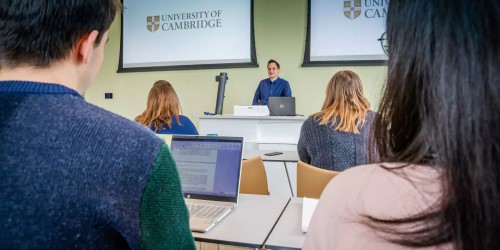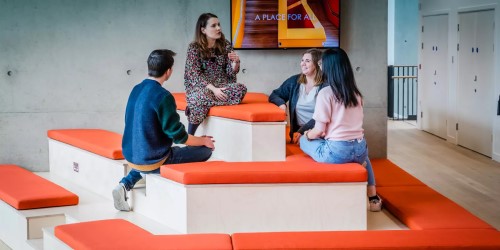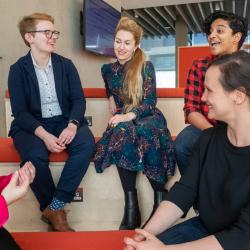On the Foundation Year at Cambridge, you will study a specially designed multi-disciplinary course. This means that the course covers a variety of subject areas in the Arts, Humanities and Social Sciences.
What you will study
The course focuses on developing your deeper learning skills and preparing you for the academic demands of Higher Education.
You will choose eight papers (modules) from four curriculum streams. These papers allow you to gain the subject knowledge relevant to your future degree subject interests. You should also expect to be introduced to new subjects and approaches.
There is also an induction week which will introduce you to the ways of learning at Cambridge. This happens before term in September.
-
Working with textual sources
This essential stream aims to help students develop a critical approach to textual sources they might encounter in different disciplines. This is applicable for subjects which rely on the interpretation and use of textual sources. You will gain an increased understanding of the variety of textual sources used in different subjects, the appropriate approaches for different disciplines and the different purposes, origins and biases of textual sources.
Examples of papers available in this stream include papers looking at policy and the British education system, a study of the Windrush Generation through poetry, an exploration of South Asian religions, a study of the interrelationship between history and law and a study of Romantic art, literature, philosophy and history.
-
Working with material sources
This optional stream aims to support students to develop a critical approach to the different types of material sources that they might encounter in further study. This will be applicable for subjects that involve sources such as art, material culture, sound, film, sculpture, sites and landscapes and more. You will develop an appreciation of the possibilities of approaches and interpretations of different kinds of material evidence and the relationships between different material sources.
Examples of papers in this stream include a study of the place of Richard III in history and culture, a study of the historical and political significance of spaces of worship and a study of portrayals of the human body in art from prehistory to the present day.
-
Working with languages
This optional stream aims to develop competence and confidence when working within a language other than English and provide an introduction to a range of ancient and modern languages. It has two components. First, it will equip you with an improved understanding of how language works, the challenges of such activities as translation, and understanding of cultural contexts. Secondly, you will be encouraged to acquire proficiency in a language other than English which could support further study of languages. Experience of formal language-learning, available through this stream, is essential or desirable for some courses.
Examples of papers in this stream include a study of the history of the English language, a study of language learning in schools, and a study of the ways in which technology can shape language.
-
Working with data
This optional stream aims to help students develop a critical approach to the different types of data sources that they might encounter. Students will learn a wide range of data analysis skills, including qualitative research training which will have a broad focus on society and community. Students will also focus on the logical principles behind data to learn to apply these. Students will be able to evaluate and interpret a range of data types, their potential sources and limitations. This will include basic analytical and statistical techniques and experience of data handling. The stream will include IT-based sessions to support handling and analysis skills development.
Examples of papers in this stream include a study of the challenges of data and policy-making with consideration of the COVID-19 pandemic, a study of environmental change and society, and a study of the ways in which data can be used in sport and society.
Optional extra-curricular language or music learning
All Foundation Year students can benefit from optional extra-curricular language learning as knowledge of languages can enhance options in many courses you may wish to progress to. This is delivered by the University of Cambridge Language Centre and can lead to certification of proficiency.
From October 2024, Foundation Year students can also benefit from optional extra-curricular music lessons that provides the opportunity to learn harmony and counterpoint skills. This may open up a pathway to further musical study for those who have not had the chance to gain the practical skills for degree study previously. This is delivered by the Faculty of Music and can lead to an additional qualification (ABRSM Grade 8 Music Theory).
How you will learn
You will be taught through lectures, seminars and supervisions, with typically 14-16 hours timetabled teaching hours each week. This, combined with your independent study, will help develop your ability to take philosophical, reflective and critical approaches using a range of methods of analysis. You will mainly be taught by the Foundation Year teaching team which is made up of University of Cambridge staff with experience teaching and researching in Higher Education.
-
Supervisions
Supervisions are small-group sessions where you will have the opportunity to explore subjects deeply, discussing your own work and ideas and receiving feedback. You will have to prepare for these sessions, usually by reading, completing worksheets or writing an essay.
-
Seminars
These are usually for medium-sized groups (15-30 students), last between one and two hours, and provide the opportunity to discuss particular topics in more detail. You’re expected to contribute actively.
-
Lectures
Lectures typically last around 50 minutes, are delivered to larger groups of students at once, and will help to introduce you to key concepts, history, or theories that will help you in your study and other teaching.
How you will be assessed
You will be assessed in a variety of different ways depending on your stream and paper choices but this will include written assignments and examinations. You will also complete one extended project on a topic that you choose within the subjects included in the course.
Where you will learn
Most of the teaching on the Foundation Year takes place at our main teaching base at the West Cambridge Hub. Opened in 2022, the West Hub has a variety of spaces for teaching and learning with modern and comfortable spaces for your lectures, seminars and supervisions. The new building also has a number of different private or small group study options across three floors. There are desks and booths for focused individual work, as well as tables and pods for group work and collaboration. The building also has a competitively priced cafeteria serving a range of hot and cold meals, a cafe bar, and a convenience store selling snacks and some basic household essentials.
Depending on your paper choices, your course may also include visits to archives, museums or sites of interest within Cambridge or elsewhere in the UK.



